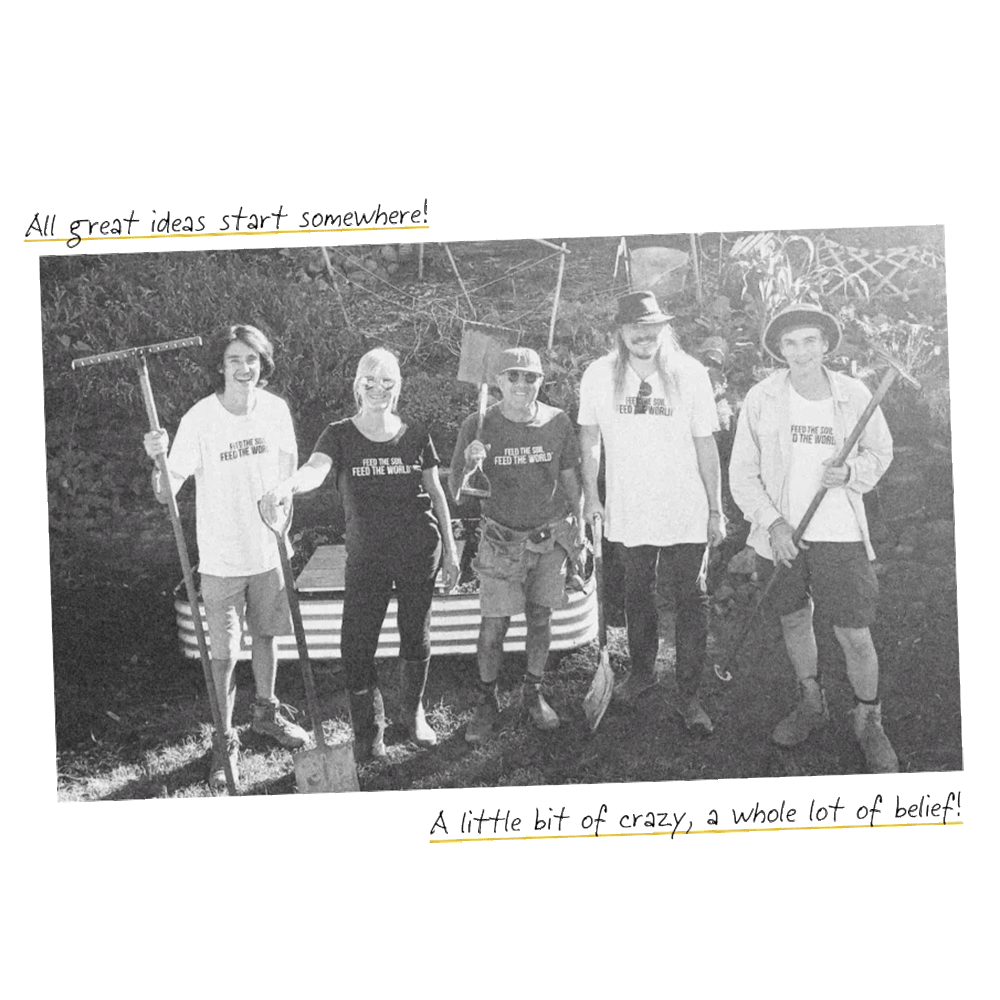Managing food waste when you live in an apartment or don’t have an outdoor space can be a problem. To combat inner-city waste, brands like Breville and Pela have released compact electronic “food recyclers” as an option for people short on time and space.
But do they turn your waste into compost?
The short answer: Nope, sorry.
Let’s take a look at how food recyclers work, and how they stack up against a system like Subpod.
What is compost?
Compost is a pretty broad term. It’s used to describe anything organic (from food scraps to poop) that has decomposed and turned into a natural soil-like substance.
The finished product is dark brown to black, moist and shapeable (think dirt snowballs) and absolutely stuffed with microbes and nutrients that are great for your garden.
Compost from @happycomposters Subpod shared in Instagram.
Simply put, compost is a rich soil/fertiliser hybrid that’s alive and ready to feed the earth.
How compost is made
Compost made in Subpod is broken down gradually by microbes, insects and compost worms. It takes between 1 - 3 months to get finished compost in a Subpod, which is pretty speedy compared to the 3 - 6 month wait of traditional compost bins.
Microbes get active as the food decays, feeding off of the decomposing materials. This attracts insects and compost worms who feed on the microbes as well as your scraps. As the worms feed, they create ‘castings’ (worm manure) which is a high quality compost and fertiliser.
Food recyclers don't make compost
All electronic food recyclers process waste a little differently. In a FoodCycler, your scraps are heated, dehydrated, shredded and cooled. FoodCycler calls the finished product “EcoChips”. EcoChips are closer to bark chips in texture and you can’t use them as fertilizer for your plants.
Photo from eftm.com
The food waste in food recyclers never actually goes through decomposition, so it will break down once it’s put in your garden or pot plants. Decomposing waste harms the roots and stalks of your plants, so EcoChips are better off going into the green bin, or being diluted in large amounts of soil.
You might be thinking, “Doesn’t it make food recyclers redundant if the end product still needs further composting?”
Well, kind of. From what we can see, the main thing you’ll achieve using a food recycler is lowering - not completely removing - the emissions created by sending your waste to landfill, or having to take less trips to a compost collection facility.
Your scraps are shredded and dried so they’re easy to store for longer periods of time, but eventually you’ll have to figure out what to do with them.
Are all food recyclers the same?
Two companies claim to be able to make real compost, and in 48 hours no less.
One is Kalea, which still shreds and dries your waste, but it then adds it to a second moisture and temperature controlled chamber which supposedly boosts microbial activity to rapidly compost your waste in 48 hours.
The second system is Lomi, which is smaller than Kalea and only has one chamber for breaking down waste. It appears to still shred and dry waste, then uses oxygen and temperature to "boost" microbes. Supposedly, Lomi can make real compost in 20+ hours.
The issue with both these system's claims is that they provide no real information on the science behind their products. There isn't any information on what temperatures they use to heat and dry the scraps, and anything above 37°– 46°C can start to kill beneficial microbes (60°C will kill pretty much everything).
The microbes that boost the composting process already exist on your food, and heating and drying scraps could kill most of them in the process. If the microbes needed to compost your waste have been killed, how can they compost your waste?
Check out this graph from Kalea's website:
They still rank the bi-product from Kalea below plain old finished compost in terms of nutrition and benefit for plants. And here’s what the difference in quality between the ‘compost’ from Kalea and finished worm castings from Subpod look like when compared.
Kalea
Subpod
In the end, Kalea and Lomi probably don't make true compost. Since they're both still in their crowdfunding phase, we’ll need to wait until real customers get a chance to use it before we know for sure.
Subpod vs. Food Recyclers
So, how does Subpod stack up against food recyclers, and which is right for you?
-
Lomi
-
Kalea
-
Foodcycler
-
Subpod
Lomi
Pros
-
Indoor friendly
-
Compact and odourless
-
Can compost bioplastics
- Claims to be able to create real compost
- Reduces the volume of your waste for easier disposal and reduced methane emissions in landfill
Cons
- No scientific data available to prove the claims it can make real compost
- No customers have recieved a Lomi since their crowdfunding ended, so there aren't any reviews
- Not very environmentally friendly, uses electricity to run and rare minerals to build
- Can malfunction or break, needing to be thrown away or replaced
- Will retail for £360
Kalea
Pros
-
Indoor friendly
-
Odourless with a larger capacity
-
Can add scraps while it's in 'compost mode'
- Claims to be able to create real compost
- Reduces the volume of your waste for easier disposal and reduced methane emissions in landfill
Cons
- No scientific data available to prove claims that it can make real compost
- No customers have recieved a Kalea since their crowdfunding ended, so there aren't any reviews
- Uses filters that need replacing
- Not very environmentally friendly, uses electricity to run and rare minerals to build
- Can malfunction or break, needing to be thrown away or replaced
- Will retail for an eye-watering £770
Foodcycler
Pros
-
Indoor friendly
-
Compact and odourless
-
Reduces the volume of your waste for easier disposal and reduced methane emissions in landfill
- Processes food quickly, within 5 - 6 hours
Cons
- Only a .9 – 1.3kg capacity per cycle
- Can be noisy, some complaints of a "screeching" noise when used
-
Doesn't make compost, only dehydrated food chips that would need further composting to be carbon neutral
- Not very environmentally friendly, uses 1kwh of electricity per cycle and rare minerals to build
-
Can malfunction or break, needing to be thrown away or replaced
- Uses filters that need replacing
- A food dehydrator and a blender might produce a similar product
- Retails for £290
Subpod
Pros
- Different size options
- Suitable for balcony gardens
- Compost non-stop, feed any time
- Creates real compost that can be used as a fertiliser on gardens and houseplants
-
Diverts 10 – 20kg of food waste from landfill a week, more than what a household of 4+ needs
-
Odourless & simple to maintain
- 20 year estimated lifetime
- All parts can be easily replaced if something malfunctions
- Reviewed by hundreds of customers (including Damien Gameau, Courtney Adamo and Geoffrey Lawton)
- Retail starts from £119
Cons
-
Requires some form of outdoor space for a garden bed
-
More hands-on than electronic food recyclers
- Unsuitable for indoor only composting
- Compost takes 1 – 3 months to finish (but hey, good things come to those who wait)
Our verdict
If you’ve got a balcony, patio or garden and want to make real compost that you know will restore life to the soil and feed your plants, Subpod is the system for you.
Even if you don’t have an outdoor space, we'd recommend using an indoor worm tower from another company over a food recycler, or at least in combination with one. Composting the EcoChips (or bi-products) from a food recycler will get you close to carbon neutral.
If you have very limited mobility, space and time, an electronic food recycler is still a better option than throwing your scraps in the bin. But at the end of the day, the bi-products from these systems will need to be disposed. They'll shrink down the impact that your waste has in landfill, but it’s really just turning a big problem into a small one.
We think that nature knows best. Composting isn't just about diverting your waste (which we love), it's also about connecting with the earth and interacting with the beneficial microbes that keep us healthy.
We hope this helps you decide which system is right for you! No matter what option you choose, thank you for helping to fight the food waste problem and taking action in your home.
In love with Subpod?
Check out our easy to use compost systems!






Leave a comment
This site is protected by reCAPTCHA and the Google Privacy Policy and Terms of Service apply.